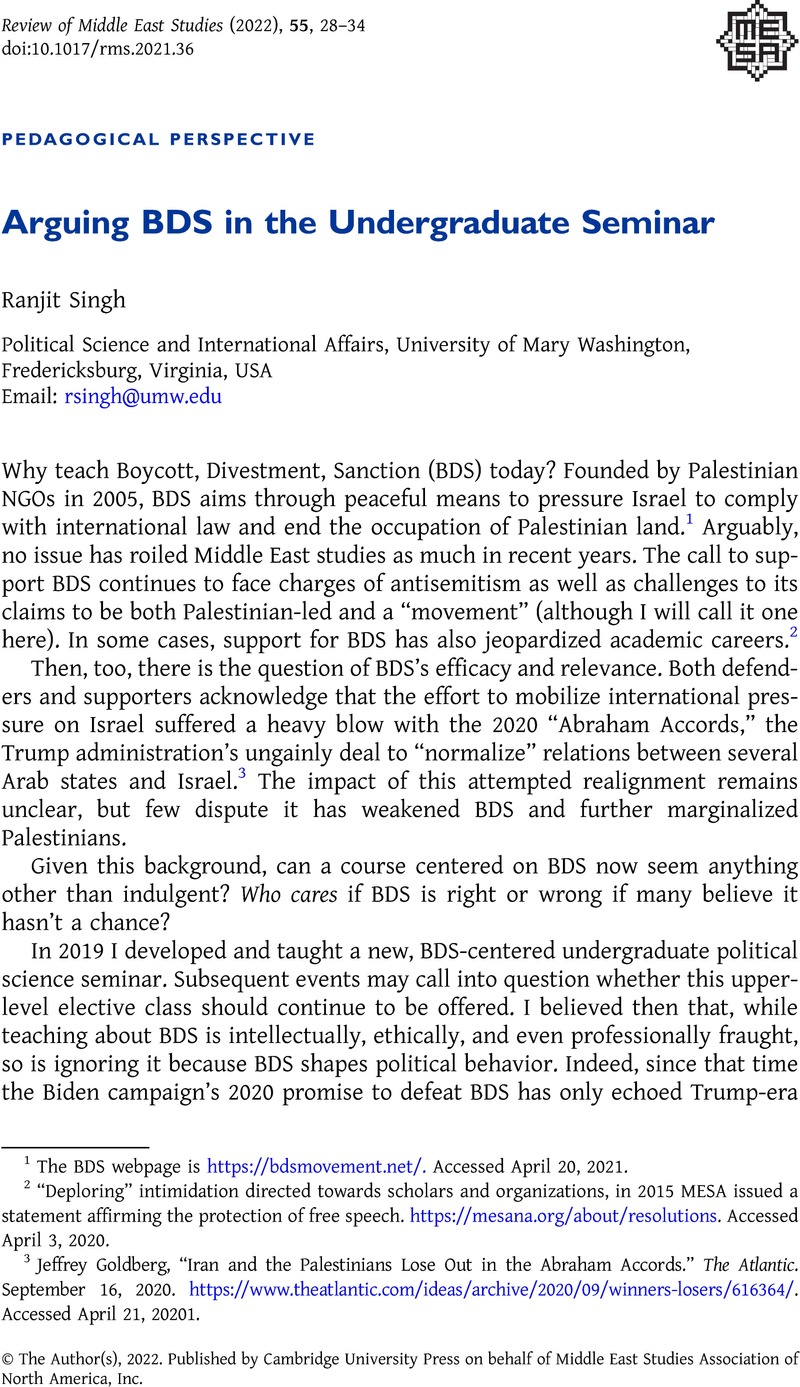Article contents
Arguing BDS in the Undergraduate Seminar
Published online by Cambridge University Press: 07 April 2022
Abstract

- Type
- Pedagogical Perspective
- Information
- Copyright
- Copyright © The Author(s), 2022. Published by Cambridge University Press on behalf of Middle East Studies Association of North America, Inc.
References
1 The BDS webpage is https://bdsmovement.net/. Accessed April 20, 2021.
2 “Deploring” intimidation directed towards scholars and organizations, in 2015 MESA issued a statement affirming the protection of free speech. https://mesana.org/about/resolutions. Accessed April 3, 2020.
3 Jeffrey Goldberg, “Iran and the Palestinians Lose Out in the Abraham Accords.” The Atlantic. September 16, 2020. https://www.theatlantic.com/ideas/archive/2020/09/winners-losers/616364/. Accessed April 21, 20201.
4 Lina Alsaafin, “Joe Biden No Saviour to the Palestinians.” AlJazeera, November 8, 2020. https://www.aljazeera.com/news/2020/11/8/joe-biden-no-savior-to-the-palestinians. Accessed April 17, 2021.
5 Barbara J. Falk, “The History, Paradoxes, and Utility of Dissent: From State to Global Action” in Ben Dorfman, ed., Histories, Aesthetics and Cultures of Dissent. (EPUB: Peter Lang, 2016). Available at https://www.peterlang.com/view/9783653959826/xhtml/chapter002.xhtml. Accessed April 10, 2021.
6 Sunstein, Cass, 2003. Why Societies Need Dissent (Cambridge: Harvard University Press, 2003)Google Scholar.
7 Henry David Thoreau, 1848. “Civil Disobedience.” http://xroads.virginia.edu/~HYPER2/thoreau/civil.html.
8 Moore, Barrington, 1966. Social Origins of Dictatorship and Democracy: Lord and Peasant in the Making of the Modern World (Boston, MA: Beacon Press): 485–486Google Scholar.
9 Karen Culcasi, “Engaging in the Boycott, Divestment, and Sanctions (BDS) Debate,” Geographical Review 106.2 (2016): 258.
10 Hirschman, Albert O. 1989. “Having Opinions – One of the Elements of Well-Being?” The American Economic Review (79) 2: 75–79.
11 Segal, Daniel. 2019. “Teaching Palestine-Israel: A Pedagogy of Delay and Suspension.” Review of Middle East Studies 53 (1): 83–88; 83.
12 In addition to Segal above, see Levine, Daniel. 2021. “Uncomfortable Conversations at a Distance: Lessons from Teaching the Israel-Palestine Conflict.” https://duckofminerva.com/2021/01/uncomfortable-conversations-at-a-distance-lessons-from-teaching-the-israel-palestine-conflict.html. Accessed April 21, 2021.
13 I told students that I was raised broadly sympathetic toward Labor Zionism (my brother lived a year on a kibbutz), and first traveled to East Jerusalem and the West Bank in 1991 while a graduate fellow at the University of Jordan. Israeli soldiers often assumed I was Palestinian, and subjected me to intimidating and humiliating situations. I returned as a field-based West Bank and Gaza program officer for the National Democratic Institute, working from 1994–96 in support of the Oslo Peace Process. During that time, I worked closely with Palestinian individuals, officials, and NGOs, as well as, to a lesser degree, their Israeli counterparts. I witnessed daily confrontations between Palestinians and Israeli soldiers, the latter frequently mistaking me for Palestinian and treating me accordingly. Since that time, my trips to Palestine and Israel have been short and infrequent, mostly to observe Palestinian elections. I traveled with Palestinian invitees to South Africa in 1994 as well, to observe the first post-apartheid election.
14 The bitter aftermath of such zero-sum academic conflicts may be seen in former professor Steve Salaita's blog, especially his recent essay, “The Utility of Uselessness” at https://stevesalaita.com/the-utility-of-uselessness/. Accessed April 21, 2021.
15 https://mesana.org/about/resolutions. Accessed April 2, 2021.
16 See “Intro to BDS.” https://bdsmovement.net/what-is-bds. Accessed April 22, 2021.
17 Nancy Clark and William Worger, 2004, South Africa: The Rise and Fall of Apartheid (Pearson, 2004), especially 35–110. Robert Ross, A Concise History of South Africa (Cambridge: Cambridge University Press, 1999), 114–162. Catherine Barnes, “International Isolation and Pressure for Change in South Africa” 19 Accord (2008). Available at https://www.c-r.org/accord/incentives-sanctions-and-conditionality/international-isolation-and-pressure-change-south. Accessed April 10, 2021.
18 Eades, Lindsay Michie, The End of Apartheid in South Africa (Westport: Greenwood Press, 1999), 77–99Google Scholar.
19 Guelke, Adrian, Rethinking the Rise and Fall of Apartheid (Houndsmills: Palgrave, 2005), 188–207Google Scholar.
20 Peteet, Julie, 2016. “The Work of Comparison: Israel/Palestine and Apartheid,” Anthropological Quarterly 89 (1): 247–281CrossRefGoogle Scholar; 276.
21 Found at https://bdsmovement.net/what-is-bds. Accessed April 12, 2021.
22 Nicola Pratt, 2015. “Boycott, Divestment, Sanctions: Myths and Realities.” Jadaliyya. https://www.jadaliyya.com/Details/31745. Accessed April 18, 2021.
23 See, for example, https://thehill.com/homenews/house/454399-house-passes-bill-opposing-bds-exposing-democratic-divides. Accessed April 18, 2021.
24 The readings are found in Geographical Review 106 (2) April 2016, available via JSTOR. Each is about 8 pages. Pro-BDS arguments are presented by Robert B. Ross, “No Space for Apartheid: Toward an Academic Boycott of Israel Among Geographers”; Yousef Munayyer, “BDS: Where It Came From and Where It is Headed”; and Ghazi-Walid Falah, “Does a Boycott of Israeli Academic Institutions Help in Ending Israel's Military Occupation of the Palestinian territories?” Opposed to BDS are David Newman, “The Failure of Academic Boycotts”; and Ira M. Sheskin and Ethan Felson, “Is the Boycott, Divestment, and Sanctions Movement Tainted by Anti-Semitism?”
25 Available on C-SPAN: https://www.c-span.org/video/?437547-1/cornel-west-alan-dershowitz-mideast-debate. Accessed April 21, 2021.
26 Hirschman, 78.
- 1
- Cited by



